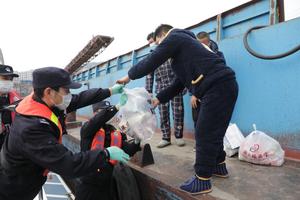 Police officers deliver food and daily necessities to stranded staff workers on a cargo ship in Wuhan, Hubei province, on March 12, 2020. (PHOTO / XINHUA)
Police officers deliver food and daily necessities to stranded staff workers on a cargo ship in Wuhan, Hubei province, on March 12, 2020. (PHOTO / XINHUA)
Wang Yong, a construction worker who helped build Wuhan's Leishanshan Hospital in 10 days to receive novel coronavirus pneumonia patients, was unable to go home when the hospital was completed in early February.
Wuhan, the capital of Hubei province and the center of the epidemic, has been locked down since late January to contain the virus. As the temporary shelters on the construction site, where he and his colleagues stayed, were demolished after the completion of the hospital, Wang had to find a cheap hotel and paid 80 yuan (US$11.5) a day to stay.
Staying here is safe, and we also get three meals a day. Without the hotel, we might be wandering in the streets now.
Hu Zhenzhu, a resident of the nearby city of Huangshi
"Life was very inconvenient, streets were empty and all restaurants and shops were closed," Wang, a 36-year-old migrant worker from nearby Hong'an county, said. "There was no chance of finding work."
ALSO READ: Govt offers financial help to those stranded in Wuhan
After staying in the hotel for two weeks, the owner told him it would be closed. Wang then called the police for help and a place was found for him at Jinlu Hotel, one of the hotels in Wuhan designated to accommodate nonresidents trapped in the city during the lockdown.
"Here I have free accommodation and three meals a day, and the food is very good," Wang said. "I am grateful to the government staff who have been helping us." There are about 60 people from outside Wuhan staying at Jinlu, in Wuhan's Jiang'an district, Chen Fanwei, a district civil affairs official, said.
"They are of all sorts of people, including migrant workers, the homeless and people who sought medical care from other places," he said. "We have arranged a doctor for them to provide basic services such as psychological consultation." In addition to free food, the district's civil affairs bureau has also provided items such as alcohol for disinfection and temperature meters to monitor the people staying in the hotel, he said.
"All people will undergo a temperature test before being accommodated in the hotel," Chen said. "We will give tests to all of them, and those who test positive for the virus during follow-up testing will be sent to a designated hospital for treatment."
There is no official data on how many people have been trapped in Wuhan since all outbound trains, buses and flights were suspended in late January, but the city government has promised to provide help if they have difficulties.
Local authorities should ensure such people have accommodation and food, and arrange for those in urgent need of medical care to go to designated hospitals for treatment, Wuhan's government said in a notice released late last month.
Yuan Mao, a Jiang'an district residential affairs official, said community workers near the hotel found it was still open early last month when they conducted an inspection, and learned from its owner that six people were staying there.
"The workers then started to provide them daily necessities such as food and water, and later the district authorities designated it as accommodations for people trapped in Wuhan," she said.
READ MORE: Visit to Wuhan buoys residents' morale
"Previously, we were focused on identifying and rescuing large numbers of patients and had no time to pay attention to such a group. But recently, our workload has been relieved due to the decrease in the number of new patients, so we have been able to provide care to these people."
Hu Zhenzhu, from the nearby city of Huangshi, is also staying at the hotel. Her 1-year-old daughter got a peanut stuck in her throat late last month, and a doctor at a hospital in Huangshi suggested they go to Wuhan Children's Hospital for better treatment.
Hu said she hurried to Wuhan with her daughter and husband despite the risk of infection.
Finding they could not go back home after the treatment, she called the mayor's hotline for help and was transferred to the hotel, she said.
"Staying here is safe, and we also get three meals a day," Hu said. "Without the hotel, we might be wandering in the streets now."
wangxiaodong@chinadaily.com.cn


